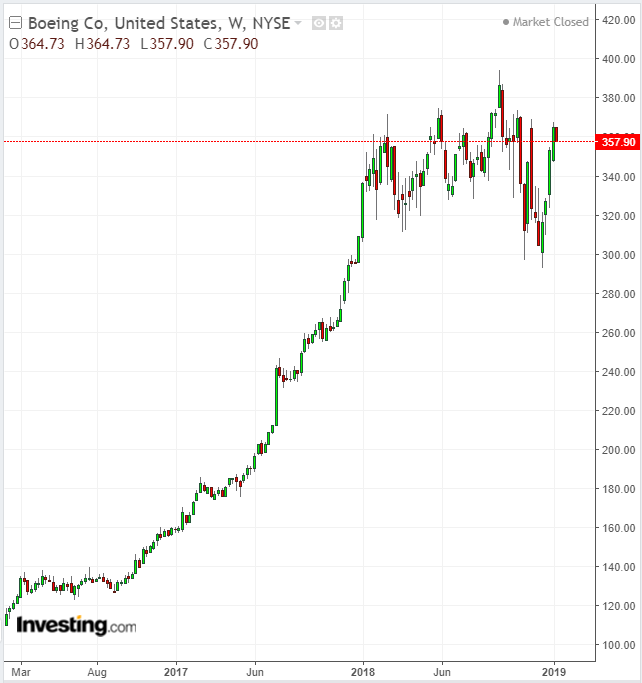- Reports Q4 2018 results on Wednesday, January 30, before the market open
- Revenue Expectation: $26.97 billion
- EPS Expectation: $4.58

Based on Boeing's (NYSE:BA) technical chart, it appears investors have unwavering faith in the aviation company's ability to survive in a tough economic environment. After shares had fallen 23% by the end of December, down from the stock's record high of around $394 which BA hit in early October, Boeing is back in the game.
Though last quarter’s market correction proved devastating for many industrial stocks, since hitting the December low Boeing shares have already recovered 19%. Investors awaiting next week's Q4 earnings report expect to see additional evidence of the company’s financial strength.
In our view, the aerospace and defense sectors are one of the few places for investors to hide if we see any clear evidence of a slowdown in economic activity. Should that be the case, Boeing, whose shares closed at $357.90 yesterday, fits the bill.
Though investors have lately traded Boeing as a proxy for the U.S.-China trade war, due to the airplane manufacturer's huge stake in China, we believe slapping retaliatory tariffs on aircraft, or canceling or deferring deliveries, could be a political tit-for-tat measure China will most likely avoid taking.
We don't see this as viable from a business perspective either. Why would China give away its price negotiation power by completely shifting its business to the rival Airbus (PA:AIR)? Currently Beijing procures aircraft mainly for its state-owned airlines and has nearly 400 Boeing orders in the pipeline.
China Risk Too Big to Ignore
In addition, the political cost for such an action from the Trump Administration perspective is also too high. In our view U.S. negotiators won't let things get to the point where China takes this extreme step. That said, the China risk is big for Boeing and investors shouldn't ignore in the short-run.
For example, when the trade war escalated, media reports started surfacing that China had revived discussions with Airbus on an $18 billion order for A320neo narrow-body jets, while Xiamen Airlines, an exclusive Boeing customer for more than 30 years, was exploring a new plane order with Airbus.
So far, Boeing has tried to downplay that risk, via lots of good news it's been able to share with investors. This includes its robust commercial airliner order book for commercial airliners and strong signs of a revival in sales to the defense industry, which have lagged for years.
According to the company’s last communication with analysts, the aerospace company was on track to meet worldwide demand for commercial aircraft. Global passenger traffic rose 6.8% on an annual basis through August of last year, while cargo traffic increased 4% over that period.
Boeing expects to bring in as much as $100 billion in revenue for the entire year, up $1 billion from a previous forecast. Its backlog of orders has risen $17 billion this year to $491 billion, representing some 5,800 commercial aircraft that have yet to be delivered.
During Boeing's last earnings call, the company raised its 2018 profit outlook, saying it expects to earn between $16.90 and $17.10 a share, up from a prior forecast for earnings that was as high as $16.60 a share.
Bottom Line
Despite the China risk, we like Boeing stock for long-term investors. It operates in a global duopoly where the only other competitor is Airbus. This strength is very appealing if you plan to add a company to your portfolio which generates strong cash flows and returns a lot of cash to investors.
During Q3, Boeing generated $4.6 billion of operating cash and repurchased $2.5 billion of Boeing stock. Though its dividend yield looks a bit meager at 2.25%, the potential for return is attractive. Its payout has grown 18% per annum over the past five years, to $8.22 a share.
